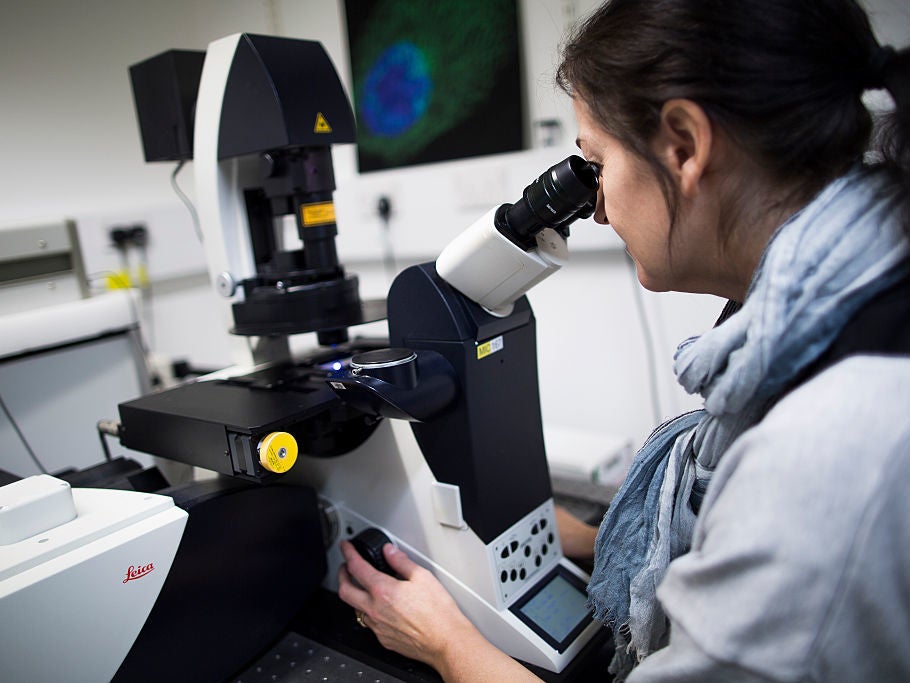What will leaving the EU mean for medical and scientific research?
Analysis: Brexit will have an impact both on patients needing drug trials and academics seeking funding, says health correspondent Alex Matthews-King


Theresa May has pledged to put medical research and biosciences at the heart of the UK economy, delivering thousands of jobs and innovations that can save lives.
But with Brexit less than three months away and polls showing a majority of Conservative Party members would prefer a no-deal Brexit to the prime minister’s plan, anxiety among scientists, research institutions and patients whose treatment depends on international drug trials is growing.
Last year The Independent spoke to Nick Sireau, who quit his job to help drive research into alkaptonuria, also known as black bone disease, after his two sons were diagnosed with the genetic disorder which affects just 88 people in the UK.
After a six-year, EU-funded clinical trial, his efforts have raised the prospect of a drug which could stop the condition damaging his sons’ bones and hearts – but he says there is now the very real prospect the manufacturer will prioritise licensing it in the EU rather than Britain.
“Brexit is a disaster for rare diseases, and generally for health,” Mr Sireau said.
“Until Europe started to get involved on an EU-wide scale, the UK had very little interest in funding rare disease research.”
Trials can give precious extra years of life to those who would miss out in the decade it takes to test and license a new drug. While the international collaboration that is essential for rare disease trials will not end with Brexit, uncertainty around the UK’s exit is already causing havoc.
Heart attack patients in England and Scotland have already missed out on a clinical trial for a new drug that could restore cardiac muscle, after the US firm developing it, Ricardio, cancelled the UK arm of the Europe-wide project.
The firm took the decision because of uncertainty over the acceptability of UK patient data when registering the drug with the European Medicines Agency, with president Dr Roman Schenk saying Brexit put companies in a “very difficult” situation.
These trials, and the research that precedes them, is also dependent on a complex network of funding and collaboration, in which the EU is a major player.
On Friday, groups representing more than 150 elite UK universities warned research would take “decades to recover” from a no-deal Brexit, which would see billions in funding for medical research lost, alongside tens of thousands of talented researchers.
This is a view echoed by virtually all major research groups, as well as professional and industry bodies.
Life sciences alone were worth £70bn to the UK economy last last year, equivalent to the automotive manufacturing sector, providing 241,000 jobs and attracting many more thousands of students to the country.
Higher Education Statistics Authority data from prior to the Brexit vote shows that among UK university academics – those who lead research projects and attract multimillion pound grants to universities – EU researchers outnumber those from other parts of the world.
There were 31,635 EU academics working in UK, 16 per cent of the total 194,000 academic staff, compared with 23,360 from the rest of the world. EU postgraduate students account for 14 per cent of the 81,000 total, compared to 36 per cent who are from outside the EU.
While Theresa May has now clarified that EU citizens living in the UK will be able to remain after Brexit, settling their status does not firm up the funding streams academics must compete for – many of which are issued by or for EU programmes.
EU nations accounted for seven of the top 10 UK collaborators which produce the most published research and, though the US remains the biggest single collaborator, its prominence has shrunk as ties with Europe have grown.

The Royal Society, one of the leading scientific voices trying to avert a no deal, warns that more than £1bn in EU funding for UK research is in peril, while researchers can easily build their career elsewhere.
European Research Council grants represent the most obvious way Brexit will damage the scientific engine at the heart of the government’s economic plans.
UK universities from the elite Russell Group won 17 per cent of the prestigious awards between 2007 and 2017, more than the total of all German universities. But without a specific provision in the withdrawal deal, researchers who receive the awards – which can be given to academics of any nationality – could no longer be hosted at British institutions.
This means fewer trials for patients, fewer new companies and potentially a hole in the government’s economic strategy while new working relationships – with the EU and further afield – are developed.
As Venki Ramakrishnan, president of the Royal Society, puts it: “If science loses, everyone loses.”
Got an unanswered question about Brexit? Send it to editor@independent.co.uk and we’ll do our best to supply an answer in our Brexit Explained series
Join our commenting forum
Join thought-provoking conversations, follow other Independent readers and see their replies
Comments
Bookmark popover
Removed from bookmarks